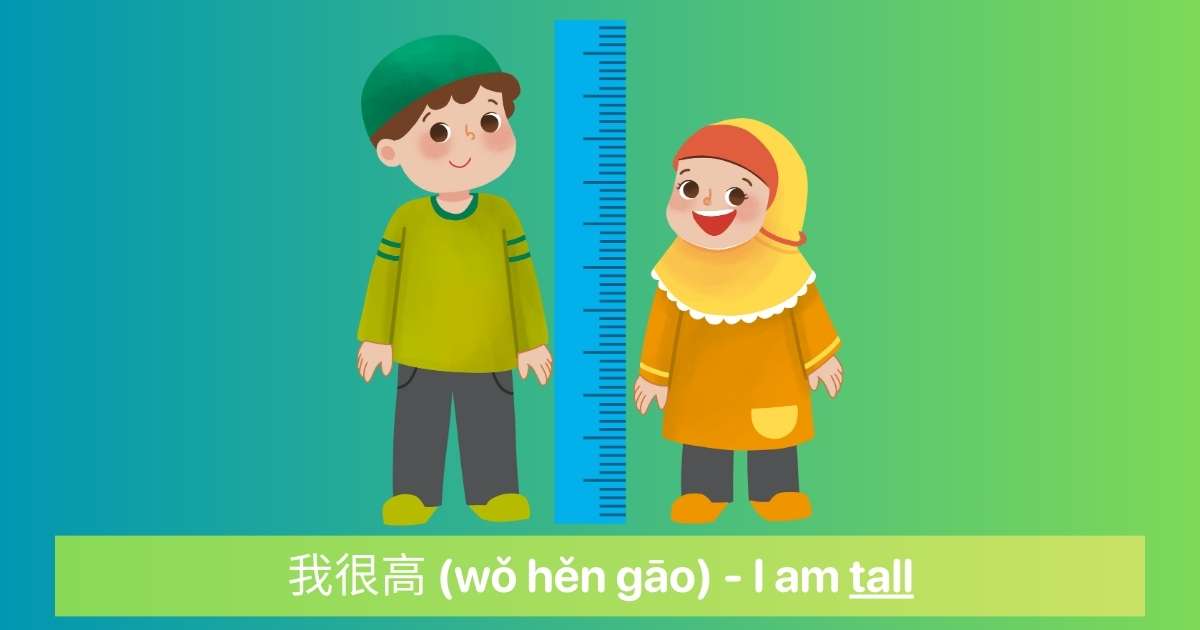I. How to use Chinese adjectives?
Chinese adjectives typically follow the pattern: 很 (hěn) + adjective when used as predicates, or adjective + 的 (de) + noun when modifying nouns directly. The position of adjectives in Chinese differs from English in several key ways:

As predicates: Place adjectives directly after the subject with 很 (hěn) for neutral statements:
- 我很高 (wǒ hěn gāo) – I am tall
As modifiers: Position adjectives before nouns with 的 (de):
- 高的人 (gāo de rén) – tall person
- 漂亮的花 (piàoliang de huā) – beautiful flower
Without 很: Adjectives alone often carry comparative or emphatic meaning:
- 今天热 (jīntiān rè) – Today is hot (compared to usual)
See also:
II. 60+ Chinese Adjectives For Beginners
These carefully selected adjectives cover essential categories you encounter daily. Each example demonstrates practical usage in real conversations, helping you build confidence in various situations.
1. Chinese adjectives to describe a person
Physical appearance and personality traits form the foundation of personal descriptions. These adjectives help you connect with others and express observations naturally.

| Chinese Adjectives | Example |
| 高 (gāo) | He is very tall and plays basketball well. |
| 矮 (ǎi) | My sister is short but very energetic. |
| 胖 (pàng) | The fat cat sleeps all day long. |
| 瘦 (shòu) | She became thin after running every morning. |
| 漂亮 (piàoliang) | The beautiful girl works as a model. |
| 帅 (shuài) | My handsome brother attracts many friends. |
| 丑 (chǒu) | Nobody is truly ugly when they smile genuinely. |
| 年轻 (niánqīng) | Young people often embrace new technology quickly. |
| 老 (lǎo) | The old man tells fascinating stories. |
| 聪明 (cōngming) | Smart students ask questions when confused. |
| 笨 (bèn) | Don’t call yourself stupid for making mistakes. |
| 友好 (yǒuhǎo) | Friendly neighbors make communities stronger. |
| 懒 (lǎn) | Lazy workers rarely achieve their goals. |
| 勤劳 (qínláo) | Hardworking farmers wake before sunrise daily. |
2. Chinese adjectives to describe mood
Emotional expressions create deeper connections in conversations. These mood adjectives help you share feelings and understand others’ emotional states.

| Chinese Adjectives | Example |
| 高兴 (gāoxìng) | I feel happy when spending time with family. |
| 伤心 (shāngxīn) | She looked sad after receiving the news. |
| 生气 (shēngqì) | He gets angry when people arrive late. |
| 紧张 (jǐnzhāng) | Students feel nervous before important exams. |
| 放松 (fàngsōng) | Vacation helps people feel relaxed and refreshed. |
| 兴奋 (xīngfèn) | Children become excited about birthday parties. |
| 害怕 (hàipà) | Many people feel scared during horror movies. |
| 担心 (dānxīn) | Parents worry about their children’s safety constantly. |
| 满意 (mǎnyì) | Customers feel satisfied with excellent service quality. |
| 失望 (shīwàng) | Fans felt disappointed when their team lost. |
| 骄傲 (jiāo’ào) | Teachers feel proud when students achieve success. |
| 羞 (xiū) | She felt shy speaking in front of large audiences. |
3. Chinese adjectives to describe food
Food descriptions enhance dining experiences and social interactions. These taste and texture adjectives help you navigate restaurants and share culinary preferences.

| Chinese Adjectives | Example |
| 好吃 (hǎochī) | This restaurant serves really delicious traditional dishes. |
| 难吃 (nánchī) | The soup tastes terrible without proper seasoning. |
| 甜 (tián) | Sweet desserts satisfy chocolate cravings perfectly every time. |
| 酸 (suān) | Sour fruits like lemons make excellent summer drinks. |
| 辣 (là) | Spicy food challenges taste buds and builds tolerance. |
| 咸 (xián) | Salty snacks pair well with refreshing beverages. |
| 苦 (kǔ) | Bitter coffee needs sugar to taste more pleasant. |
| 热 (rè) | Hot soup warms bodies during cold winter days. |
| 冷 (lěng) | Cold ice cream provides relief from summer heat. |
| 新鲜 (xīnxiān) | Fresh vegetables contain more nutrients than processed alternatives. |
| 油腻 (yóunì) | Greasy food often causes stomach discomfort afterward. |
| 清淡 (qīngdàn) | Light meals help maintain healthy digestion patterns. |
4. Adjectives in Chinese to describe work
Professional environments require specific vocabulary for career advancement. These workplace adjectives help you discuss job performance and work conditions effectively.

| Chinese Adjectives | English Example |
| 忙 (máng) | Busy professionals often work late into the evening. |
| 闲 (xián) | Free time allows workers to pursue personal interests. |
| 累 (lèi) | Tired employees need adequate rest for peak performance. |
| 轻松 (qīngsōng) | Easy tasks boost confidence and build momentum. |
| 困难 (kùnnan) | Difficult projects require teamwork and creative solutions. |
| 重要 (zhòngyào) | Important meetings determine company direction and strategy. |
| 简单 (jiǎndān) | Simple processes increase efficiency and reduce errors significantly. |
| 复杂 (fùzá) | Complex problems demand careful analysis and planning. |
| 成功 (chénggōng) | Successful businesses adapt quickly to market changes. |
| 失败 (shībài) | Failed attempts provide valuable learning opportunities for growth. |
| 专业 (zhuānyè) | Professional behavior earns respect and trust from colleagues. |
| 认真 (rènzhēn) | Serious workers produce higher quality results consistently. |
5. Chinese adjectives to describe travel or views
Travel vocabulary enriches your ability to share experiences and plan adventures. These descriptive adjectives help you capture the beauty and excitement of exploration.

| Chinese Adjectives | English Example |
| 美丽 (měilì) | Beautiful landscapes attract millions of tourists annually worldwide. |
| 壮观 (zhuàngguān) | Spectacular sunsets create unforgettable memories for travelers. |
| 安静 (ānjìng) | Quiet beaches offer peaceful retreats from busy city life. |
| 吵闹 (chǎonào) | Noisy markets buzz with energy and local culture. |
| 干净 (gānjìng) | Clean hotels ensure comfortable stays for weary travelers. |
| 脏 (zāng) | Dirty streets detract from otherwise charming neighborhood character. |
| 宽 (kuān) | Wide roads accommodate heavy traffic flow during rush hours. |
| 窄 (zhǎi) | Narrow alleys hide fascinating shops and local restaurants. |
| 远 (yuǎn) | Far destinations require careful planning and extra preparation time. |
| 近 (jìn) | Near attractions allow spontaneous visits and easy exploration. |
| 拥挤 (yōngjǐ) | Crowded tourist spots challenge photographers seeking perfect shots. |
| 空旷 (kōngkuàng) | Spacious parks provide room for outdoor activities and relaxation. |
| 古老 (gǔlǎo) | Ancient temples tell stories spanning thousands of years. |
| 现代 (xiàndài) | Modern cities showcase cutting-edge architecture and urban planning. |
Read more:
Mastering these 70+ essential Chinese adjectives provides the foundation for expressing yourself naturally and confidently in Mandarin. Ready to learn Chinese? Take your language skills to the next level with Gurulango now!